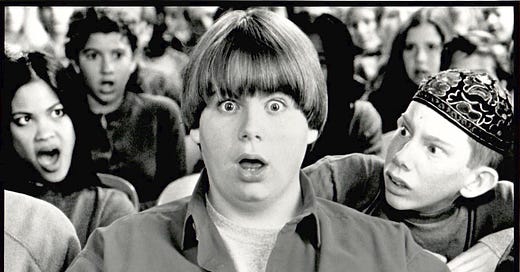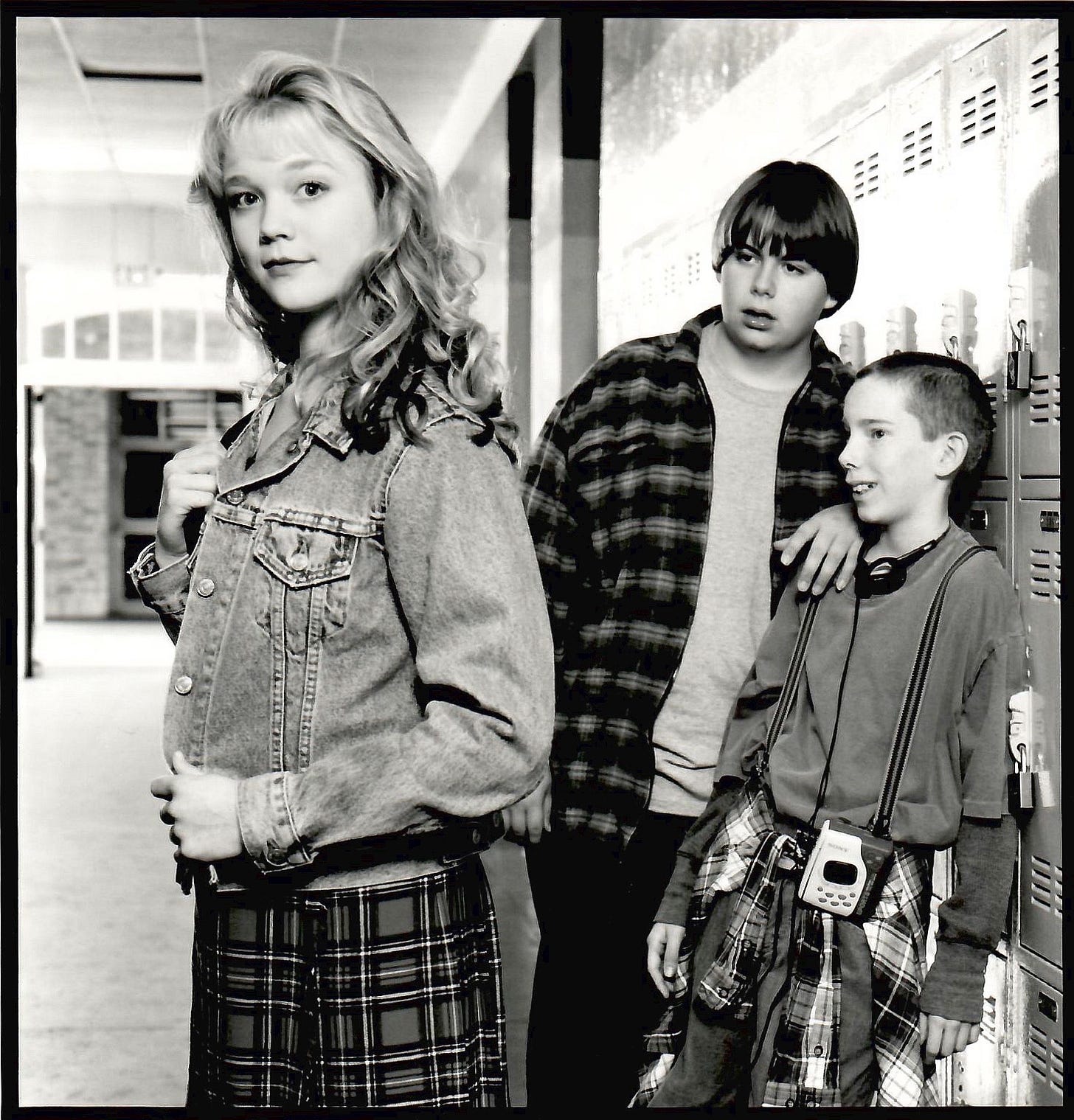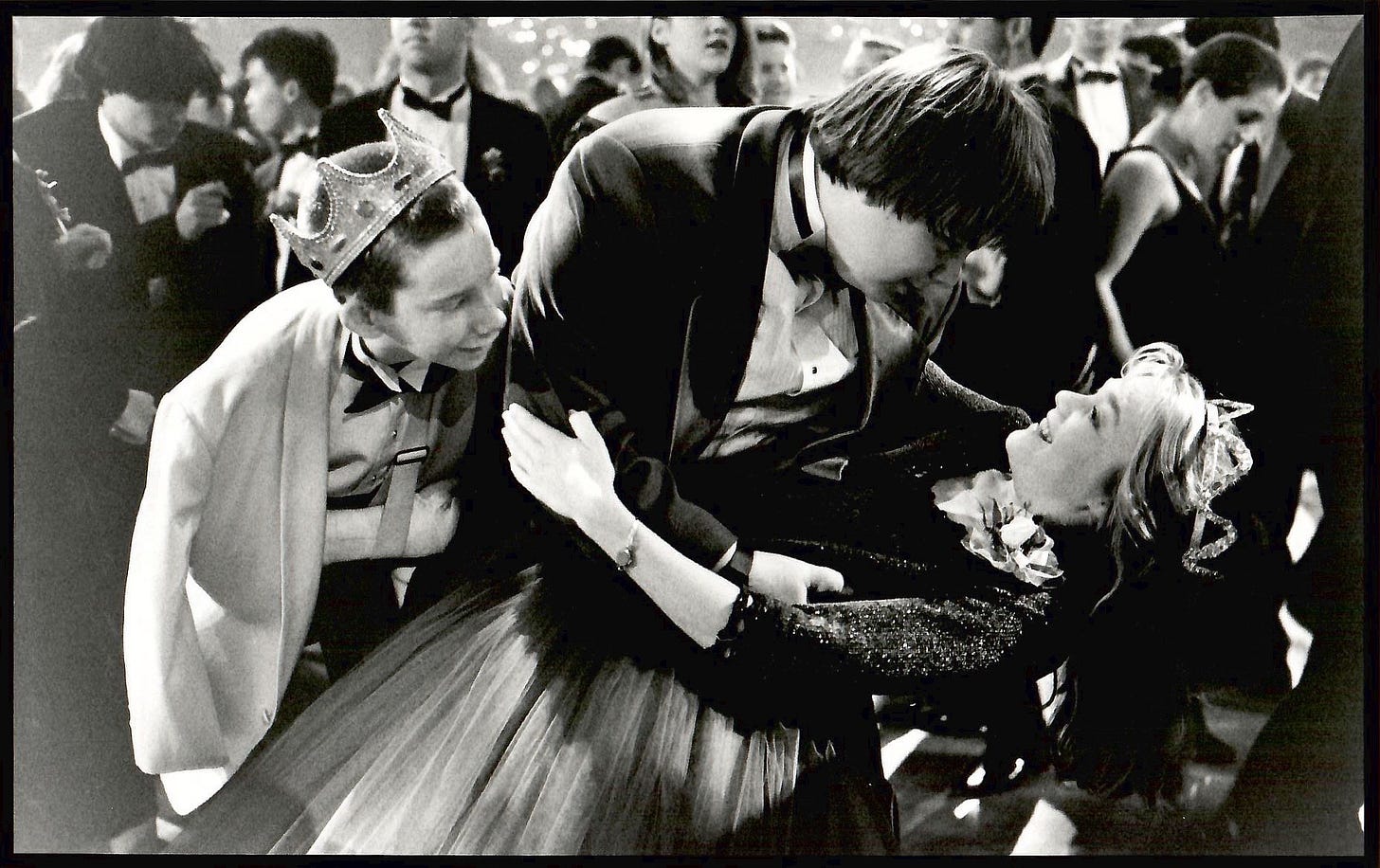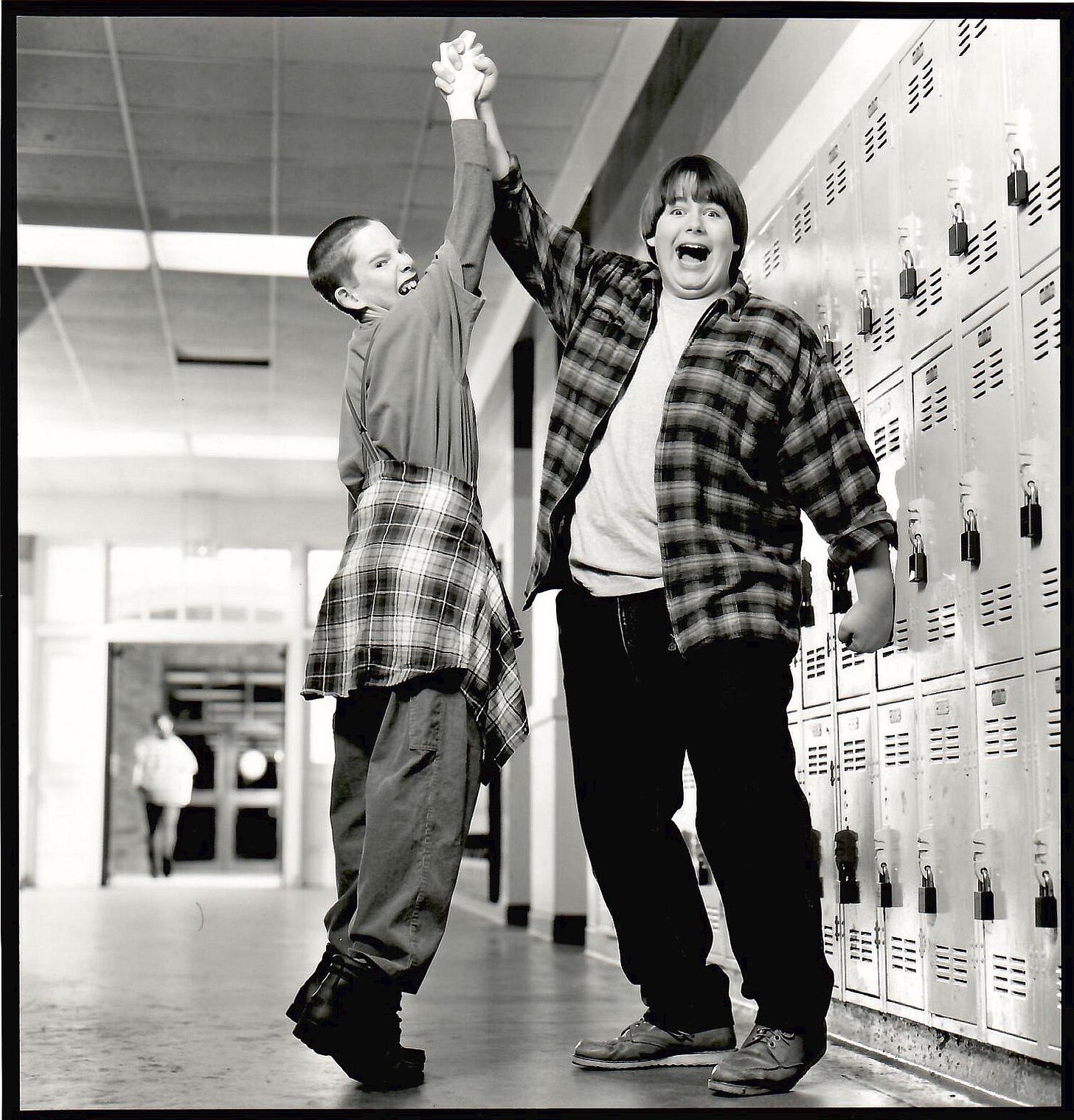Angus (1995) Scenes and Book: Superman's Not Brave
A kid scouted at Wendy's starred, the "Jurassic Park girl" and future Sherminator co-starred, and the first woman to head a major studio produced. This movie rocks!
This article is based on information from the original press kit sent to film critics before the movie’s release on September 15, 1995.
Little did I know that the raunchy, endearing movie I was watching in my grandma’s living room as a young boy in the 90s was based on a short story called A Brief Moment In The Life of Angus Bethune, part of a collection of short stories called Athletic Shorts by Chris Crutcher.
My grandma encouraged me to watch many movies when my family visited her in Warren, PA—a small town three hours north of where we lived in Pittsburgh. She probably did this because she knew I was bored. As a kid, I loved playing outside with other kids in my neighborhood, but there were none in hers. So movies it was. Mostly the Ernest movies. But one day Angus must have come on the tube (or we rented it) and she let it run despite words like “boner” and “dildo” and topics like bulimia and bullying.
How was I able to watch this? And why do I remember the scenes so vividly? We must have watched the movie many, many times. But during a wonderfully nostalgic rewatch it all made sense. Angus is about more than horny, hormonal teens; it’s about breaking free from the system you feel trapped in instead of running away (there's a big difference)...about owning your downsides (being fat for Angus, having bad acne for me)...and about being your authentic self. It could very well be that we only watched this movie once and it was so powerful that it would stay with me forever.
The movie also features George C. Scott who starred in Patton (1970) in a comedic role as Angus’s grandpa. My grandma loved war movies so I think seeing him in this strange, lovely role must have captivated her while Angus and his friend Troy gawking and talking about Melissa Lefevre played by “the Jurassic Park girl” captivated me. Meanwhile, themes of friendship, courage, and perseverance were entering my subconscious and priming me to become a decent boy who could still say words like boner.
“I think we have a job as filmmakers to make movies that inspire people,” said producer Dawn Steel who championed movies like Flashdance (1983), Footloose (1984), and Top Gun (1986) and was the first woman to head a major film studio in 1987 at Columbia. Dawn died a few years after saying this and it got me wondering about how she must have applied the themes in this movie to persevere in Hollywood. Not as a fat kid, but as a woman in a male-dominated industry.
In a 1993 interview, Dawn said she attended a fundraiser at the home of Lew Wasserman, "the most important man in Hollywood" and chairman of Universal at the time. Even though she was the head of production at Paramount when she attended, she felt out of place in a sea of male executives, had a “shy attack,” and decided to leave. When she was waiting for her car, Bob Daly, chairman of Warner Bros. studio at the time, approached her with his hand out. She extended hers, expecting a handshake, but he gave her his car keys instead thinking she was the valet. “It’s a white Mercedes," he told her.
Obviously she had persevered to make it that far in Hollywood already, but it seems she had not yet activated The Bethune Theory, Angus's science experiment that postulates that within every normal system is an aberration—something different—and if the aberration is powerful and brave enough to survive the sources against it, the system must adapt. I wouldn’t be surprised if this theory and theme of bravery absent in the short story was proposed or at least adored by Dawn for inclusion in the screenplay and movie.
During the scene with the “Bueller… Bueller”-like admissions interviewer, Angus decides to change the system and face the music at the school dance rather than running away from the bullies and his dream girl (1:05:05).
“If the element can look the system in the eye and say, ‘I’m still here asshole!’, then the system will have to change… adapt… mutate. And if this happens it will have proved my fucking point. There is no normal."
Which beautifully sets up the final showdown at the dance with the bully Rick played by James Van Der Beek (Varsity Blues, Dawson’s Creek) in his feature film debut.
After Angus "has his moment" and dance with Lefevre (played by the beautiful Ariana Richards who now paints) Rick punches Angus in the face and Angus retaliates. But instead of beating Rick up, Angus gives an impassioned speech about how no one at the school is normal—just Rick.
“So which is it, Rick? Are you normal or just one of us?” (1:18:58)
It’s fitting that casting the role for Angus happened in an abnormal way.
The director Patrick Read Johnson stopped by a Wendy’s one night and noticed a kid in line making jokes with his friends. Patrick envisioned the character Angus coming through this kid as he observed then asked the kid if he'd be interested in auditioning for a movie.
“Come on, get real,” Charlie Talbert said. “I’m in a Wendy’s line at twelve o’clock at night with my friends, and this guy walks over with change in his hand and introduces himself as a movie director," he told New Line Cinema. "Yeah, right — sure you’re a movie director!"
Not long after that night at Wendy's, Charlie auditioned for Angus and won an inaugural role as a starring actor in a major studio film. All from just being who he was. In line. With his buds. At Wendy's. Which is what the movie’s about: being who you are and continuing to be that person despite the system you’re in, whether that system is a Wendy’s with your friends or a school with bullies, "popular kids," and girls who make you sweat.
In both the movie and book, this idea of being brave enough to be who you are is driven home by the “superman isn’t brave” concept, explained by his grandpa in the movie (55:15) and his gay stepdad, Alexander, in the book (p.17).
“Superman’s not brave. He’s smart. He’s handsome. He’s even decent. But he’s not brave.”
“Alexander, have I ever said it’s hard to follow you sometimes?”
“He’s indestructible,” Alexander says. “You can’t be brave when you’re indestructible. It’s guys like you and me that are brave, Angus. Guys who are different and can be crushed—and know it—but go out there anyway.”
This is one of the few scenes that are strikingly similar between the book and movie, with the exception of the characters delivering the lines. According to a Refinery29 interview with Charlie, scenes that included Angus's gay dad and stepdad were filmed but later scrapped. I'm hopeful there was a good reason, but the movie does suffer from the cuts.
The movie opens with Angus saying his dad died of a heart attack (instead of being gay) and therefore his family is different and he gets made fun of which doesn't really add up. The movie also doesn’t mention anything about his mother being gay like it does in the book (p.5)
Four parents are what I have altogether, not unlike a whole lot of other kids. But quite unlike a whole lot of other kids, there ain’t a hetero among ‘em. My dad’s divorced and remarried, and my mom’s divorced and remarried so my mathematical account of my family suggests simply another confused teenager from a broken home. But my dad’s aren’t married to my mom’s. They’re married to each other. Same with my moms.
Any trace of homosexuality is removed from the movie. This is unfortunate since it would raise the stakes for Angus’s bravery and better prove his theory. However, the movie still stands strong and benefits from having other parts of the book cut, like the part at the dance when Lefevre wipes sweat from Angus’s brow then touches her finger to her tongue (p.29). In your dreams Angus! Or, in your dreams Chris Crutcher (the author). Thank God for me as that young boy in Warren, PA, and my grandma watching from the couch behind me that Angus’s courageous defiance of Rick replaced that part of the book.
Another great quality of the movie that’s not in the book is Angus’s sidekick Troy and their “BUDS!” high five (16:25) and high punch (1:21:28). Years later, the actor who played Troy (Chris Owen) would act the iconic role as Sherminator in American Pie (1999).
Angus also has some great music thanks to Dawn Steel and other producers of the movie who formed Atlas Entertainment, a company that managed artists such as Alanis Morissette, Weezer, and The Goo Goo Dolls at the time, the latter band responsible for the song that plays during the nostalgic schoolbus dropoff scene (09:15).
Little moments like this that capture what's often overlooked in high school are part of what makes this movie special, including the opening scene with the marching band and majorettes performing in sync with the song Am I Wrong by Love Spit Love (3:44). God I love how movies from the 90s valued opening credits and weren't afraid to take their time and warm you up for the main event.
How about you? What do you love about this movie? What's your favorite scene? It's the 30 year anniversary for the movie and the album by The Goo Goo Dolls that holds that nostalgic school dropoff scene song along with many other hits. Go ahead and treat yourself!
How to watch the scenes in this post: Rent or buy Angus on YouTube and use the timestamp links above. If you already own the movie, link your license to YouTube with Movies Anywhere. You must close YouTube before watching consecutive scenes due to a glitch, but this method is still the best way to rewatch your favorite movie scenes and support the movie.







